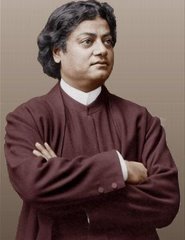My God The Poor
In modern times, as recently as 1881-1886, such an excellent pair of guru-shishya had incarnated on this earth as Sri Ramakrishna and Swami Vivekananda. In the following short article an attempt is made to focus on the excellence of disciple Vivekananda borne out of deepest  yearning to realize Truth, unflinching devotion, and sharpness of intellect. His life excelled in all facets of spiritual quest. However, an attempt is made to highlight one aspect only, and that is, how Swami Vivekananda grasped the hidden meaning of 'Shiva Jnane Jiva Seva' in the words of his Master. This mantra of seeing God in poor later formed the backbone for his universal message of 'Atmano Mokshartham Jagadhitayacha' - for the liberation of the self, and welfare of the world.
yearning to realize Truth, unflinching devotion, and sharpness of intellect. His life excelled in all facets of spiritual quest. However, an attempt is made to highlight one aspect only, and that is, how Swami Vivekananda grasped the hidden meaning of 'Shiva Jnane Jiva Seva' in the words of his Master. This mantra of seeing God in poor later formed the backbone for his universal message of 'Atmano Mokshartham Jagadhitayacha' - for the liberation of the self, and welfare of the world.
'You are fortunate that the poor accepted alms from you. Bow down to him in reverence as if you are serving God.' If such an advice were given to us, most of us would reflexively recoil from the idea. Poor, the God! No. It may be relatively easy to bow down before intellectuals, rich, wise, or accomplished persons with the attitude of reverence, but our vanity does not allow us to adopt the same worshipful attitude towards poor. Our pride swells up during such interaction and we look down upon the poor as a lowly placed human being, and words like kindness, charity, and help possess our mind. We become superior and he the inferior. We think we help him. We are privileged and he is a destitute, unfortunate, and underprivileged person. 'I am helping him by ameliorating his suffering and hunger. I am doing charity, I am compassionate to him', such and similar thoughts come to our mind, which we logically try to rationalize in our favour.
It requires very high level of spiritual growth-atma-vikasa-to actually see 'God' in the poor. It is a rare development of soul (consciousness), borne out of intense sadhana (spiritual practice) that makes this really possible. Otherwise it remains an ideal only-a theoretical proposition. Like so many dictums, this also ends up in a cliche for most of us.
During his visit to Dakshineswar in 1884, Swami Vivekananda (then Narendranath) learnt a wonderful lesson from Sri Ramakrishna of 'serving man as God-Shiva Jnane Jiva Seva'.
Sri Ramakrishna was speaking with his devotees. In the course of discussion he said,
"...And one should have the conviction in one's heart that the whole universe belongs to Krishna; and therefore, one should have compassion for all beings." No sooner had Sri Ramakrishna uttered the words 'compassion for all beings', than he suddenly went into ecstasy. Regaining partial normal consciousness in a short time, he continued, "Talk of compassion for beings! Insignificant creatures that you are, how can you show compassion to beings? You wretch who are you to bestow it? No, no; it is not compassion to Jivas but service to them as Siva."
All went on listening to those words of the Master spoken in that ecstatic mood; but ...It was Narendranath (Swami Vivekananda) alone who, coming out of the room at the end of Master's ecstasy said, "Ah, what a wonderful light have I got to day from the Master's words! What a new and attractive Gospel have we received to day..."
Later in life, the purpose of the teachings of Swami Vivekananda was to help everyone to actualize this concept of realization of God in human beings. His famous Upanishad-like saying 'Every soul is potentially divine', meant that we ourselves, and everyone around us are potentially divine. Religion is to manifest this divinity within us first, which would automatically make our vision clear enough to see the same divinity in others as well. Then the poor would not remain poor; he would become divine in our eyes -- as he really is.
In the famous letter (July 1897) written to Miss Mary Hale it becomes clear what Swami Vivekananda meant by 'my God the poor':
"...And may I be born again and again, and suffer thousands of miseries so that I may worship the only God that exists, the only God I believe in, the sum total of all souls-and above all, my God the wicked, my God the miserable. My God the poor of all races, of all species, is the special object of worship."
Ordinarily, devotional worship, selfless service, meditation, and discrimination are the means to self-purification, so that higher spiritual attitude may develop in the life of sadhaka. But in case of Swami Vivekananda, the attitude of worship of 'God in poor' was in fact the highest spiritual experience itself. In its sublimity, it even surpassed the grandeur of nirvikalpa samadhi! This unique state is probably never elaborated with sufficient clarity in scriptures, although, one finds some glimpses of this truth in the life of Lord Buddha and Jesus Christ.
It was to the credit of Sri Ramakrishna who conceived this idea in relation with the extraordinary capacity of his foremost disciple-Swami Vivekananda. Once Swami Vivekananda asked Sri Ramakrishna to grant him the bliss of samadhi. To this Sri Ramakrishna said:
"Why don't you settle your family affairs and then come to me? You will get everything. What do you want?" Swami Vivekananda replied, 'It is my desire to remain absorbed in samadhi continually for three or four days...' Thereupon he (Sri Ramakrishna) said, "You are a small-minded person. There is state higher than that..."
And as if to prepare him to realize that higher state of seeing God everywhere, real life event of a magnitude of a 'disaster' occurred in the early age of Swami Vivekananda. His father suddenly passed away leaving the family in debt and disarray. The relatives and friends, instead of helping Narendranath, took away their dues leaving the family almost pauper. Moreover, Narendranath could not even get a job to support his family. The agony of not able to support the family made a deep impression on the tender mind of Narendranath (he was just 21 years of age then).
Was that Divine disposition or play? Was that necessary for Swami Vivekananda to actually suffer poverty to later understand it in the poor? One cannot say. All the same in later life Narendranath evolved into Swami Vivekananda and preached whole world the blissful doctrine of seeing God in poor and illiterate, and worshiping them accordingly. The agony, as if, turned into ecstasy!
Swami Vivekananda had many real-life experiences during his wandering years all over India. The reality of seeing God everywhere, particularly in lowly and poor, matured during the continuous sadhana in his life, in India and abroad.
It would be proper to quote some of his teachings, events and incidents in this regard:
"Look upon every man, woman, and everyone as God. You cannot help anyone, you can only serve: Serve the children of the Lord; serve the Lord Himself, if you have the privilege. If the Lord grants that you can help any one of His children, blessed you are; do not think too much of yourselves. Blessed you are that that privilege was given to you when others had it not. Do it only as worship. I should see God in the poor, and it is for my salvation that I go and worship them. The poor and the miserable are for our salvation, so that we may serve the Lord, coming in the shape of the diseased, coming in the shape of lunatic, the leper, and the sinner!"
At the Belur Math in the year 1901, a number of Santhal labourers were engaged to clear and level the Math grounds. Sometimes hearings their tales of poverty and sufferings the Swami would be moved to tears. Once the Swami made elaborate arrangements for their noonday meal-a 'feast'.
"The Swami himself supervised the arrangements and the serving of food to his guests. From time to time the Santhals exclaimed, 'Oh Swami! Where did you get such fine things? We have never tasted such dishes before.' When the meal was over, the Swami told them, 'You are Narayana; today I have entertained the Lord Himself by feeding you!' Later, to a disciple he remarked, 'I actually saw the Lord Himself in them.'"
Thus it will be seen that, for Swami Vivekananda 'my God the poor' was the intuitive realization of God in Its manifestation as poor-as one aspect of Reality. The swami, the poor and the poverty had as if become one in his spiritual personality.
 yearning to realize Truth, unflinching devotion, and sharpness of intellect. His life excelled in all facets of spiritual quest. However, an attempt is made to highlight one aspect only, and that is, how Swami Vivekananda grasped the hidden meaning of 'Shiva Jnane Jiva Seva' in the words of his Master. This mantra of seeing God in poor later formed the backbone for his universal message of 'Atmano Mokshartham Jagadhitayacha' - for the liberation of the self, and welfare of the world.
yearning to realize Truth, unflinching devotion, and sharpness of intellect. His life excelled in all facets of spiritual quest. However, an attempt is made to highlight one aspect only, and that is, how Swami Vivekananda grasped the hidden meaning of 'Shiva Jnane Jiva Seva' in the words of his Master. This mantra of seeing God in poor later formed the backbone for his universal message of 'Atmano Mokshartham Jagadhitayacha' - for the liberation of the self, and welfare of the world.'You are fortunate that the poor accepted alms from you. Bow down to him in reverence as if you are serving God.' If such an advice were given to us, most of us would reflexively recoil from the idea. Poor, the God! No. It may be relatively easy to bow down before intellectuals, rich, wise, or accomplished persons with the attitude of reverence, but our vanity does not allow us to adopt the same worshipful attitude towards poor. Our pride swells up during such interaction and we look down upon the poor as a lowly placed human being, and words like kindness, charity, and help possess our mind. We become superior and he the inferior. We think we help him. We are privileged and he is a destitute, unfortunate, and underprivileged person. 'I am helping him by ameliorating his suffering and hunger. I am doing charity, I am compassionate to him', such and similar thoughts come to our mind, which we logically try to rationalize in our favour.
It requires very high level of spiritual growth-atma-vikasa-to actually see 'God' in the poor. It is a rare development of soul (consciousness), borne out of intense sadhana (spiritual practice) that makes this really possible. Otherwise it remains an ideal only-a theoretical proposition. Like so many dictums, this also ends up in a cliche for most of us.
During his visit to Dakshineswar in 1884, Swami Vivekananda (then Narendranath) learnt a wonderful lesson from Sri Ramakrishna of 'serving man as God-Shiva Jnane Jiva Seva'.
Sri Ramakrishna was speaking with his devotees. In the course of discussion he said,
"...And one should have the conviction in one's heart that the whole universe belongs to Krishna; and therefore, one should have compassion for all beings." No sooner had Sri Ramakrishna uttered the words 'compassion for all beings', than he suddenly went into ecstasy. Regaining partial normal consciousness in a short time, he continued, "Talk of compassion for beings! Insignificant creatures that you are, how can you show compassion to beings? You wretch who are you to bestow it? No, no; it is not compassion to Jivas but service to them as Siva."
All went on listening to those words of the Master spoken in that ecstatic mood; but ...It was Narendranath (Swami Vivekananda) alone who, coming out of the room at the end of Master's ecstasy said, "Ah, what a wonderful light have I got to day from the Master's words! What a new and attractive Gospel have we received to day..."
Later in life, the purpose of the teachings of Swami Vivekananda was to help everyone to actualize this concept of realization of God in human beings. His famous Upanishad-like saying 'Every soul is potentially divine', meant that we ourselves, and everyone around us are potentially divine. Religion is to manifest this divinity within us first, which would automatically make our vision clear enough to see the same divinity in others as well. Then the poor would not remain poor; he would become divine in our eyes -- as he really is.
In the famous letter (July 1897) written to Miss Mary Hale it becomes clear what Swami Vivekananda meant by 'my God the poor':
"...And may I be born again and again, and suffer thousands of miseries so that I may worship the only God that exists, the only God I believe in, the sum total of all souls-and above all, my God the wicked, my God the miserable. My God the poor of all races, of all species, is the special object of worship."
Ordinarily, devotional worship, selfless service, meditation, and discrimination are the means to self-purification, so that higher spiritual attitude may develop in the life of sadhaka. But in case of Swami Vivekananda, the attitude of worship of 'God in poor' was in fact the highest spiritual experience itself. In its sublimity, it even surpassed the grandeur of nirvikalpa samadhi! This unique state is probably never elaborated with sufficient clarity in scriptures, although, one finds some glimpses of this truth in the life of Lord Buddha and Jesus Christ.
It was to the credit of Sri Ramakrishna who conceived this idea in relation with the extraordinary capacity of his foremost disciple-Swami Vivekananda. Once Swami Vivekananda asked Sri Ramakrishna to grant him the bliss of samadhi. To this Sri Ramakrishna said:
"Why don't you settle your family affairs and then come to me? You will get everything. What do you want?" Swami Vivekananda replied, 'It is my desire to remain absorbed in samadhi continually for three or four days...' Thereupon he (Sri Ramakrishna) said, "You are a small-minded person. There is state higher than that..."
And as if to prepare him to realize that higher state of seeing God everywhere, real life event of a magnitude of a 'disaster' occurred in the early age of Swami Vivekananda. His father suddenly passed away leaving the family in debt and disarray. The relatives and friends, instead of helping Narendranath, took away their dues leaving the family almost pauper. Moreover, Narendranath could not even get a job to support his family. The agony of not able to support the family made a deep impression on the tender mind of Narendranath (he was just 21 years of age then).
Was that Divine disposition or play? Was that necessary for Swami Vivekananda to actually suffer poverty to later understand it in the poor? One cannot say. All the same in later life Narendranath evolved into Swami Vivekananda and preached whole world the blissful doctrine of seeing God in poor and illiterate, and worshiping them accordingly. The agony, as if, turned into ecstasy!
Swami Vivekananda had many real-life experiences during his wandering years all over India. The reality of seeing God everywhere, particularly in lowly and poor, matured during the continuous sadhana in his life, in India and abroad.
It would be proper to quote some of his teachings, events and incidents in this regard:
"Look upon every man, woman, and everyone as God. You cannot help anyone, you can only serve: Serve the children of the Lord; serve the Lord Himself, if you have the privilege. If the Lord grants that you can help any one of His children, blessed you are; do not think too much of yourselves. Blessed you are that that privilege was given to you when others had it not. Do it only as worship. I should see God in the poor, and it is for my salvation that I go and worship them. The poor and the miserable are for our salvation, so that we may serve the Lord, coming in the shape of the diseased, coming in the shape of lunatic, the leper, and the sinner!"
At the Belur Math in the year 1901, a number of Santhal labourers were engaged to clear and level the Math grounds. Sometimes hearings their tales of poverty and sufferings the Swami would be moved to tears. Once the Swami made elaborate arrangements for their noonday meal-a 'feast'.
"The Swami himself supervised the arrangements and the serving of food to his guests. From time to time the Santhals exclaimed, 'Oh Swami! Where did you get such fine things? We have never tasted such dishes before.' When the meal was over, the Swami told them, 'You are Narayana; today I have entertained the Lord Himself by feeding you!' Later, to a disciple he remarked, 'I actually saw the Lord Himself in them.'"
Thus it will be seen that, for Swami Vivekananda 'my God the poor' was the intuitive realization of God in Its manifestation as poor-as one aspect of Reality. The swami, the poor and the poverty had as if become one in his spiritual personality.




